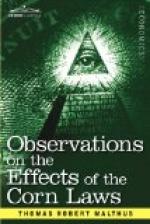That no such exception exists with regard to corn, is implied in all the general reasonings of the Wealth of nations. Dr Smith evidently felt this; and wherever, in consequence, he does not shift the question from the exchangeable value of corn to its physical properties, he speaks with an unusual want of precision, and qualifies his positions by the expressions much, and in any considerable degree. But it should be recollected, that, with these qualifications, the argument is brought forward expressly for the purpose of showing, that the rise of price, acknowledged to be occasioned by a bounty, on its first establishment, is nominal and not real. Now, what is meant to be distinctly asserted here is, that a rise of price occasioned by a bounty upon the exportation or restrictions upon the importation of corn, cannot be less real than a rise of price to the same amount, occasioned by a course of bad seasons, an increase of population, the rapid progress of commercial wealth, or any other natural cause; and that, if Dr Smith’s argument, with its qualifications, be valid for the purpose for which it is advanced, it applies equally to an increased price occasioned by a natural demand.
Let us suppose, for instance, an increase in the demand and the price of corn, occasioned by an unusually prosperous state of our manufactures and foreign commerce; a fact which has frequently come within our own experience. According to the principles of supply and demand, and the general principles of the Wealth of nations, such an increase in the price of corn would give a decided stimulus to agriculture; and a more than usual quantity of capital would be laid out upon the land, as appears obviously to have been the case in this country during the last twenty years. According to the peculiar argument of Dr Smith, however, no such stimulus could have been given to agriculture. The rise in the price of corn would have been immediately followed by a proportionate rise in the price of labour and of all other commodities; and, though the farmer and landlord might have obtained, on an average, seventy five shillings a quarter for their corn, instead of sixty, yet the farmer would not have been enabled to cultivate better, nor the landlord to live better. And thus it would appear, that agriculture is beyond the operation of that principle, which distributes the capital of a nation according to the varying profits of stock in different employments; and that no increase of price can, at any time or in any country, materially accelerate the growth of corn, or determine a greater quantity of capital to agriculture.
The experience of every person, who sees what is going forward on the land, and the feelings and conduct both of farmers and landlords, abundantly contradict this reasoning.




